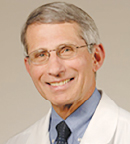In an article published in Science, Lawrence Corey, MD; John R. Mascola, MD; Anthony S. Fauci, MD; and Francis S. Collins, MD, PhD, describe the composition and aims of the National Institutes of Health (NIH)-led Accelerating COVID-19 Therapeutic Interventions and Vaccines (ACTIV) partnership.

Lawrence Corey, MD

John R. Mascola, MD

Anthony S. Fauci, MD

Francis S. Collins, MD, PhD
The program is a public-private collaboration intended to streamline the processes of SARS-CoV-2 candidate vaccine development and testing, including serving as a centralized program for the harmonization of clinical trials and accelerated licensure and distribution of successful vaccine candidates and therapeutic modalities.
Challenges in Vaccine Development
The authors describe the host of problems inherent in understanding what constitutes an effective immune response to COVID-19: ascertaining the optimal mechanisms and vaccine components for achieving protective vaccine responses (including protection from infection and severe clinically symptomatic disease); evaluating and comparing different candidate vaccines and other therapeutic modalities; and efficiently and safely testing candidate vaccines in human populations. They note that several vaccine platforms are already moving towards clinical evaluation, including traditional recombinant protein, replicating and nonreplicating viral vectors, and nucleic acid DNA and mRNA approaches. Candidate vaccines already in development stages include: nucleic acid-based vaccines; those using traditional recombinant protein technology to express the spike protein (which mediates viral entry into host cells); and viral vector vaccines encoding viral genes of interest into such well-characterized vectors as adenovirus and vesicular stomatitis virus.
ACTIV Composition and Mission
A primary objective of the ACTIV initiative is to avoid duplications of efforts and ensure rapid communication among entities involved in vaccine development, clinical testing, and distribution in order to tackle and overcome the aforementioned difficulties. The NIH partners in the effort include sister agencies in the Department of Health and Human Services, including the U.S. Food and Drug Administration, Centers for Disease Control and Prevention, and Biomedical Advanced Research and Development Authority; other U.S. government departments, including the Departments of Defense and Veterans Affairs; the European Medicines Agency; and representatives from academia, philanthropic organizations, more than 15 biopharmaceutical companies, and the non-profit Foundation for NIH. Much of the program focus will be on clinical trials in the United States; however, the COVID-19 Prevention Networks established under the ACTIV program have a global focus intended to include coordination with the World Health Organization, Coalition for Epidemic Preparedness Innovations, and other global philanthropic partners.
As stated by the authors, harmonized master protocols for clinical trials of vaccine candidates, as developed through the government-supported infrastructure of the ACTIV program, will be needed to ensure transparent evaluation of the relative effectiveness of diverse vaccine approaches and will be best achieved by public/private partnerships. Effective harmonization will require involvement of government-supported central laboratories, independent biostatisticians, and collaboration with private companies; the effort must include data-sharing among companies, independent statistical evaluation, use of collaborating clinical trial sites, monitoring of efficacy trials through a common Data and Safety Monitoring Board, independent statisticians with access to cross-trial data in real time, and centralized immune monitoring laboratories.
“These innovations in the process of vaccine development are required to achieve the rapid development of the platform technologies entering clinical trials. Global effort, global cooperation, and transparency are needed to maximize the speed, veracity, and decision-making required to deliver scientific advances to the global population in a timely fashion. Models for all of these programs exist, and rapid implementation of these ideas is essential if we are to succeed in the timelines required to return us to pre–COVID-19 social interactions.”— Lawrence Corey, MD; John R. Mascola, MD; Anthony S. Fauci, MD; and Francis S. Collins, MD, PhD
Tweet this quote
As stated by the authors, “These innovations in the process of vaccine development are required to achieve the rapid development of the platform technologies entering clinical trials. Global effort, global cooperation, and transparency are needed to maximize the speed, veracity, and decision-making required to deliver scientific advances to the global population in a timely fashion. Models for all of these programs exist, and rapid implementation of these ideas is essential if we are to succeed in the timelines required to return us to pre–COVID-19 social interactions.”
Dr. Corey is affiliated with the Vaccine and Infectious Disease Division, Fred Hutchinson Cancer Research Center (Past President and Director) and Departments of Medicine and Lab Medicine, University of Washington, Seattle; Dr. Mascola is Director, Vaccine Research Center, National Institute of Allergy and Infectious Diseases, National Institutes of Health; Dr. Fauci is Director, National Institute of Allergy and Infectious Diseases, National Institutes of Health; and Dr. Collins is Director, National Institutes of Health.
Dr. Fauci is the corresponding author for the Science article.
Disclosures: For full disclosures of the study authors, visit science.sciencemag.org.

